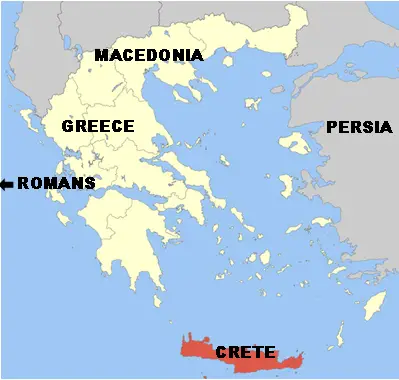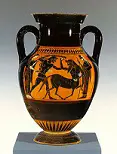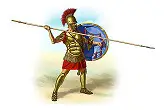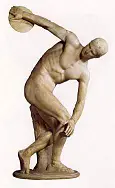Greek History
Greek history is an interesting look at a wonderful era of human invention, philosophy, art and architecture. The earliest civilizations in Greece were in two different areas: on the island of Crete and on the mainland of Greece.

PRE-GREEK CIVILIZATIONS
 The civilization on Crete was called the Minoan civilization.
The civilization on Crete was called the Minoan civilization.
Even though the people from Crete were not Greek, they had an important impact on Greek civilization and culture.
Crete was a powerful and wealthy empire, and Greeks on the mainland absorbed much of their culture and products, like myths, pottery, writing, and painting styles.
The civilization based on the mainland is called the Mycenaean civilization. The people on the Greek mainland began settling there around 2000 BC. Because the geography of Greece is made up of small valleys, many independent communities developed, rather than one unified state.

THE DARK AGES OF GREECE

Historians aren’t sure why, but in from 1100 to 800 BC, the Mycenaean (or Greek) culture went into a period where we have little evidence of culture, art, reading, and writing. This period is referred to as the Dark Ages of Greece. Some historians think that the decline, or fall, in culture was due to invaders called sea-people (like pirates!) who made it impossible for the Greeks on the mainland to trade anything in the Mediterranean Sea, and hurt the Greek economy.

THE GREEK RENAISSANCE
Even though the Greek economy was so weak during the dark ages, Greek culture survived. Greeks were not able to trade, but they still kept alive by farming, weaving, and making pottery.
After the Dark Ages, Greek culture revived and came back to life. The time period after the Dark Ages is called the Greek Renaissance. This was a time when Greek culture came back with a vengeance. Greeks broke into new frontiers of culture and entered a period of intellectual vibrancy, or a time when thinking and new ideas and inventions were all over the place!


This was a time when Greek religion was important, and the beliefs of the Olympian Gods and Goddesses and the building of temples and shrines dedicated to these gods was important.
Public games, sporting, and athletic events were an important past time, which eventually led to the creation of the Olympic Games that we still celebrate today!

Greeks adopted and utilized a new alphabet, which is very similar to the one we use today.
Literature was written, and included everything from detailed histories of Asia Minor to love poetry and public documents.

Pottery was created with beautiful and elaborate designs.
Philosophy, and the love of thinking and argument was developed and large schools of philosophers asked themselves about the meaning of life.
Architecture and the creation of beautiful buildings were important.

The government and economy were structured into a form of democracy that we are familiar with today.
The arts, including painting, sculpture, mosaic, and metalworking were developed into some of the most beautiful examples of artwork in history.

PERSIA AND WAR
From around 500 to 400 BC, Greece went to war with Persia. Persia was an area to the East of Greece. If Greece had control of the areas next to the sea, then that meant that Greece could control most of the Mediterranean Sea. This was one of the reasons for different wars with Persia.
One of these wars was called the Peloponnesian War, which left the economy and government of Greece weak. This led to the next great era in Greece history, after it was conquered by Alexander the Great.

ALEXANDER THE GREAT AND HELLENISTIC GREECE

After the Peloponnesian War, Greece was weak. The king of Macedonia, an area north of Greece, declared war on Greece and his son, Alexander, continued the conquest of Greece. After conquering Greece, Alexander went on to conquer Egypt, Persia, and a big part of Asia Minor, which is east of Persia.
This led to a period of time called the Hellenistic Age. The Greeks called themselves Hellenes, and because Alexander was based in Greece, and had conquered most of the Western world, the whole area controlled by Alexander was called the Hellenistic World.
This period of time was a lot like the Greek Renaissance, but it was a little bit different. Instead of just being a time when Greek culture was expanding, the Hellenistic Age was a time when Greek culture mixed with Egyptian, Persian, and Asian cultures. This led to wonderful advancements in philosophy, mathematics, physics, and astronomy, just to name a few.
ROMAN CONQUEST

The Hellenistic Age did not last forever, though. For many different reasons, the Greek empire under Alexander the Great was eventually conquered by a different force. These were the Romans, which lived in what is now Italy, which is to the West of Greece.
Even though the Romans conquered Greece, they still recognized the superior quality of the culture of the Greeks. Because of this, they copied and preserved many Greek paintings, sculptures, buildings, and other artifacts, which is one of the reasons why we still have so many today.



